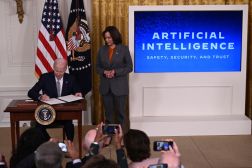White House: Cyber war deal with China a long way off
When President Barack Obama meets with his Chinese counterpart Xi Jinping this week, China’s economic cyber-espionage against U.S. firms will be on the table, but it’s only one element of a vast and complex relationship, White House officials told reporters Tuesday.
Any agreement with Beijing on international cybersecurity norms is a long way off, the officials said, declining to rule out the possibility of punitive measures including sanctions against Chinese companies or officials.
“We believe very strongly that the U.S. and China both have interest in investing in clear international norms as it relates to cyber activity,” said Deputy National Security Adviser Ben Rhodes. “The goal here is you start a common understanding,” he added.
“You have agreed upon principles and as the two largest countries in the world, I think we can lead an effort to develop international norms that govern cyber activity,” Rhodes said.
The New York Times reported earlier this week that the U.S. and China has been negotiating such a deal, under which both countries would agree to foreswear cyber attacks against critical infrastructure in peacetime.
“I’m reluctant to raise expectations but it’s a long term goal, ” said Dan Kritenbrink, senior director for Asian affairs for the National Security Council. “We’re a long ways from getting there but that certainly is a goal.”
Rhodes said cyberattacks on U.S. businesses will be a “very important part of the agenda and the discussion” during Xi’s visit. U.S. officials distinguish between conventional espionage achieved through cyber-means and the online theft of intellectual property on a massive scale to benefit Chinese companies at the expense of their U.S. competitors.
“We’re working together to try to arrive at common principles that give us greater confidence that China is acting in a manner that does not disadvantage our businesses,” Rhodes said.
Chinese officials have repeatedly denied government involvement in hacking. At a welcoming banquet Tuesday evening in Seattle, Xi said China is a “staunch defender of cybersecurity, but has also been hacked,” calling for anyone responsible for hacking brought to justice by rule of international law.
“Commercial cybertheft against government networks are crimes that must be punished in relevance to international treaties,” Xi said. “The international community should work to ensure and a peaceful and open cybersecurity space.”
Xi also said he was willing to open joint dialogue in fighting cyber crime together with the U.S. Chinese and U.S. investigators have already cooperated on a handful of cases, including an online purveyor of child pornography.
Cybersecurity was a topic of conversation during the the last visit of Xi to the U.S. when he met Obama in Sunnylands, California, in 2013. Rhodes admitted that things have soured since then, with attacks continuing to affect American businesses.
“Cyber is an issue where we have not made the progress we have wanted to make,” Rhodes said. “We’ve not seen the types of steps that give our companies greater assurance and we have been very forthright about that.”
In the event that those goals goes unfulfilled, Rhodes said the U.S. is prepared to take “punitive measures,” including economic sanctions.
“Sanctions remain a tool and we are prepared if necessary to pursue sanctions if we felt a case that merited that type of punitive action,” he said.
However, Rhodes said the cyber issue is only one in a complicated relationship between the world powers.
“There’s going to be parts of the relationships thats cooperative and parts that competitive. We welcome the peaceful rise of prosperous China,” he said. “What we’re not going to do is, because we have significant differences with China, we’re not going to cooperate with them on other issues.”






